De Kuip: Feyenoord
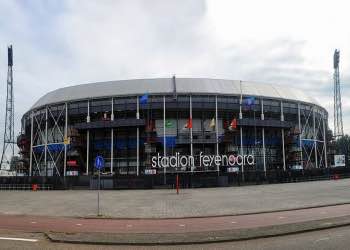
By Валерий Дед (Stadion Feijenoord 2014-08-27) [CC BY 3.0], via Wikimedia Commons
Feyenoord Rotterdam, better known simply as Feyenoord, is a Dutch football team that is one of the most successful clubs in the Netherlands. Founded in 1908 under the name Wilhelmina, they became SC Feijenoord in 1912, SC Feyenoord in 1974 and finally Feyenoord Rotterdam four years after that. They’ve been playing their games in Stadion Feijenoord since 1937, though the stadium is better known by the name De Kuip. This means ‘The Tub’ in Dutch and was so named because of the shape and general look of the venue.
Despite having been renovated numerous times over the years the one that hasn’t changed is the external structure, hence the reason it’s maintained its nickname to the point that most people wouldn’t know what Stadion Feijenoord was. Despite their most successful period coming back in the 1960s and 1970s, Feyenoord are still considered to be the ‘people’s club’, given their large national support. That’s not to suggest that they haven’t won anything since the turn of the millennium, however, with a KNVB Cup win in 2016 and 2018 as well as an Eredivisie title in 2017.
Stats
| De Kuip Stats | |
|---|---|
| Year Opened | 1937 |
| Capacity | 51177 |
| Average Attendance | 47500 |
| Record Attendance | 65427 (Feyenoord v Twente (1968)) |
| Pitch Size | 105 x 68 (7140) |
| Nickname | De Kuip |
| Owner | Stadion Feijenoord N.V. |
| Clubs Hosted | Feyenoord, Netherlands national football team |
| First Fixture | Feyenoord v Beerschot (27/03/1937) |
| Feyenoord Stats | |
|---|---|
| Year Founded | 1908 |
| Nickname | De club aan de Maas (The Club on the Meuse), De Stadionclub (The Stadium Club), De Trots van Zuid (The Pride of the South), De club van het volk (The Club of the People) |
| Club Mascot | Coentje |
| Rivals | Ajax, Sparta Rotterdam, Tottenham Hotspur |
| Previous Stadiums | Kromme Zandweg |
| Kit | Red, White & Black (Home) / Grey, Black & Yellow (Away) / Green (Third) |
| Training Ground | Sportcomplex Varkenoord |
| Shirt Sponsor | Euro Parcs |
| Team Owner | Feyenoord Rotterdam N.V. |
| Record Goalscorer | Jaap Barendregt (196) |
| Record Appearances | Coen Moulijn (487) |
De Kuip Photos
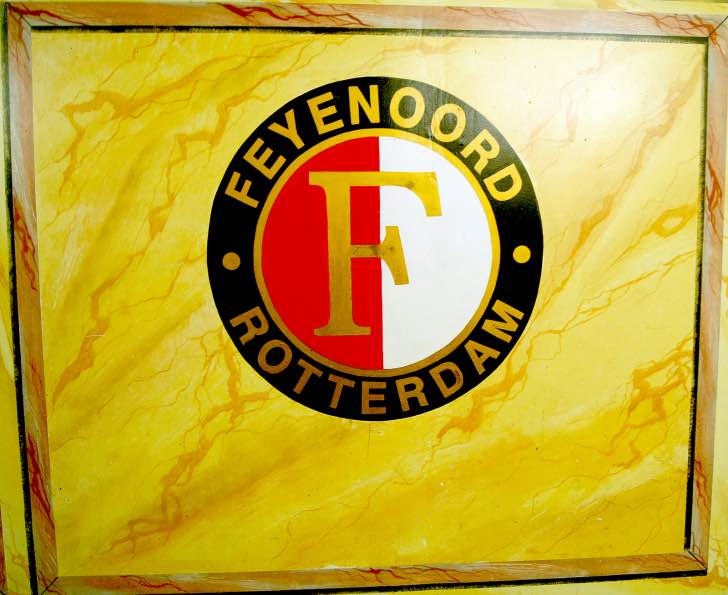
G-Tinnetje / Flickr.com
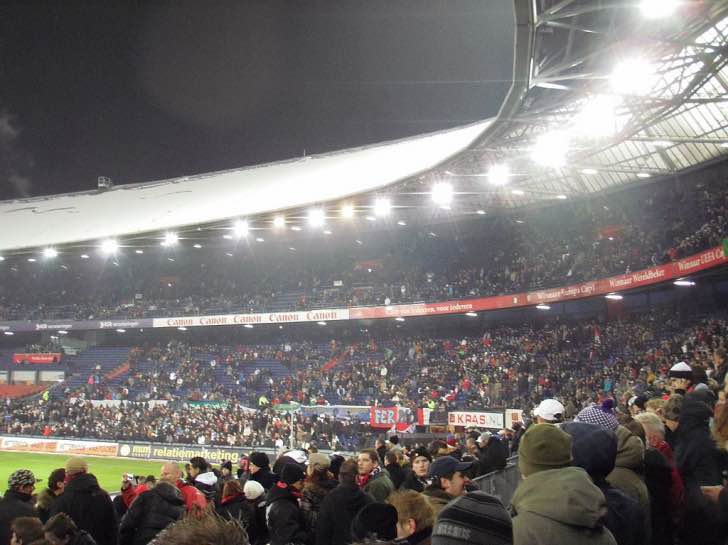
StevenL [CC BY-SA 3.0]
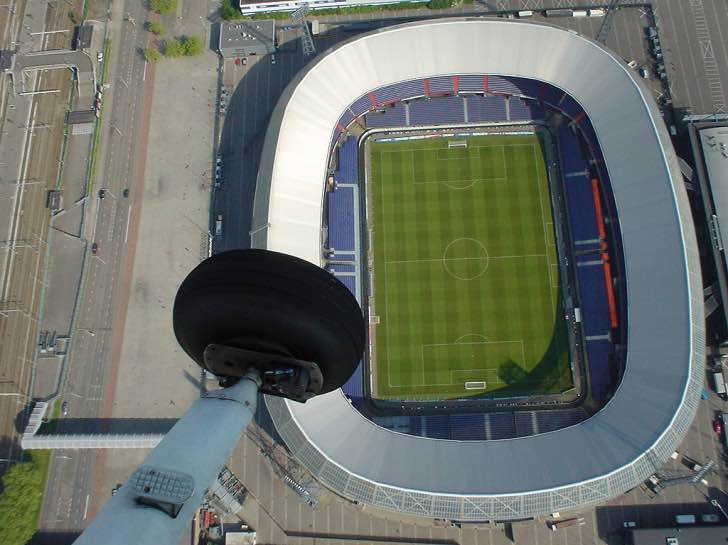
By R.M.Jaarsma (Own work) [GFDL
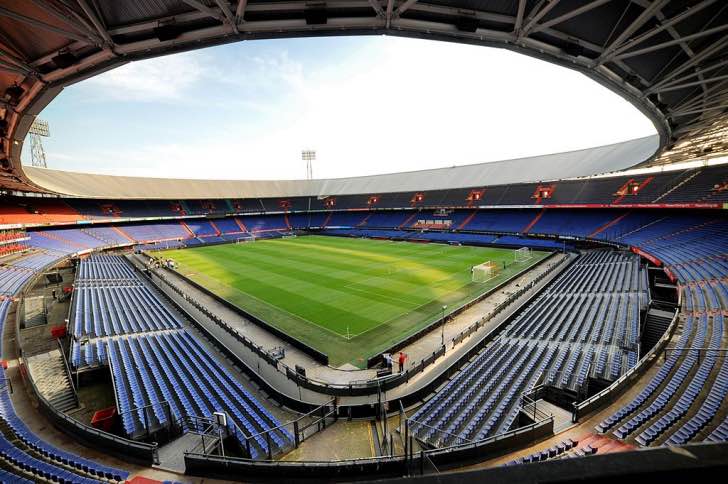
By Валерий Дед (De Kuip Inside the stadium.) [CC BY 3.0]
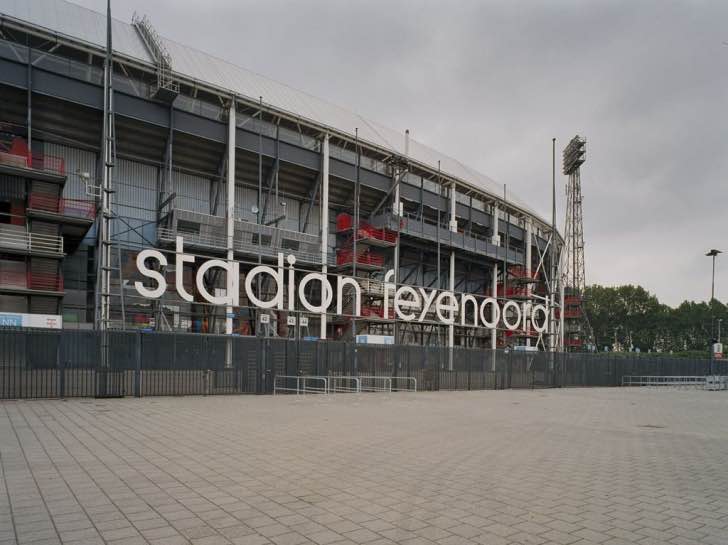
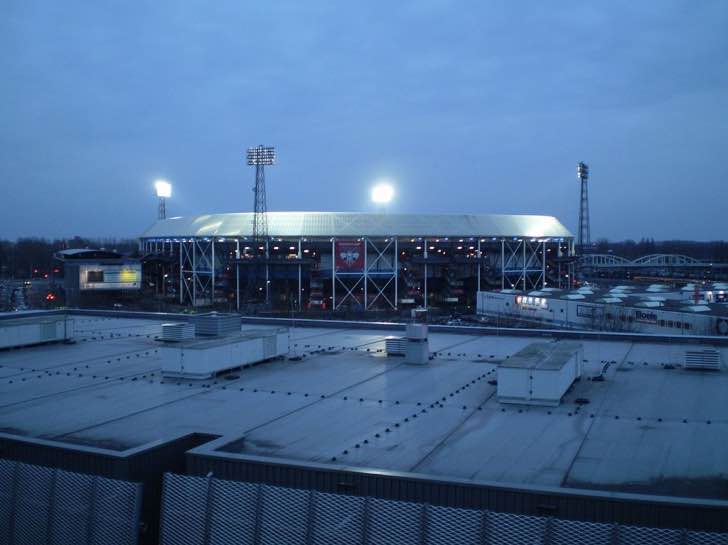
John - el - Castillo [CC BY 3.0]
De Kuip Seating Plan and Where to Sit
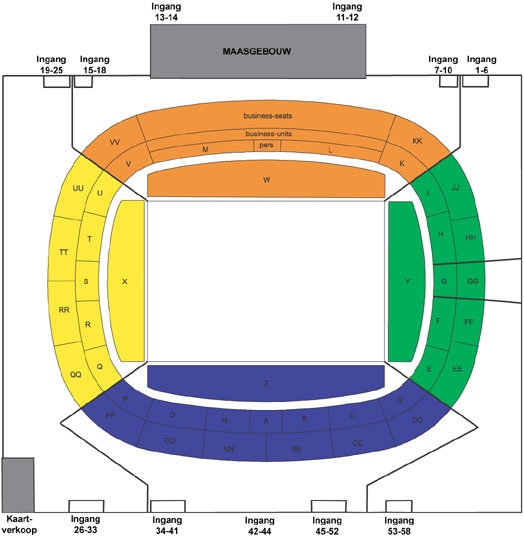
De Kuip is designed in a bowl style, similar to other big European grounds. There are essentially three tiers that run around the structure, with Maastribune the stand where the executive lodges and VIP seating are located.
Feyenoord Ticket Prices
Where you want to sit and how old you are will dictate how much you have to pay for your tickets at De Kuip. If you’re an adult, for example, then you’re likely to pay between €23.50 and €63.50, whilst anyone over 65 will pay €23. Younger people will pay around €21.
How To Get Feyenoord Tickets
Feyenoord’s official website is the best place to go if you want to book tickets to see them play. That said, plenty of Dutch people are fluent in English so you can try to call the ticket office directly if you’d prefer. You need membership to log into their ticket site so calling might actually be easier.
Where to Buy
Getting To De Kuip
Train – It takes just under four hours to get from London to Rotterdam by train, heading via Brussels, Antwerp or Thalys. You’ll arrive at Rotterdam Centraal from where you can get a train to Rotterdam Stadion, which is right next the stadium.
Bus – If you’d rather get their via bus then the B16 is the main one that stops outside the ground. Alternatively you can get a tram and numbers 12 and 23 both stop with walking distance.
Car – The A16 is the main road that runs close to the stadium, with the S106 and S125 the smaller roads that run directly past it.
By Air – Rotterdam The Hague Airport is less then ten miles from the ground, though Amsterdam Airport Schiphol is an alternative but it’s further afield at closer to fifty miles.
Taxi – Getting a taxi from Rotterdam Centraal out to the stadium will cost you about €15 and take around twenty minutes.
Parking Near De Kuip
There are a number of car parks located around the ground, though priority for parking at these is given over to season ticket holders and VIP guests. Still, you’ll likely be able to nab a space if you’re getting there early enough.
Useful Resources
De Kuip Hotels
Waking up in one of the following establishments, you might be thinking; “This could be Rotterdam, or anywhere, Liverpool, or Rome.” But it would 100% be Rotterdam. And if you don’t know who Beautiful South are then that sentence will mean nothing to you.
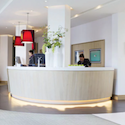
Novotel Rotterdam Brainpark - £60+
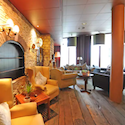
Art Hotel Rotterdam - £80+
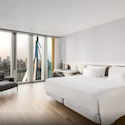
nhow Rotterdam Hotel - £100+
Pubs and Bars Near De Kuip
It’s not hard to find a pint near De Kuip.
De Witte Aap
Bar Restaurant Level
Panenka
Facilities
As one of the top clubs in the country, you can expect everything you might need at De Kuip, from places to eat and drink to the club shop. Seating is also fairly good with unspoiled views.
Hospitality
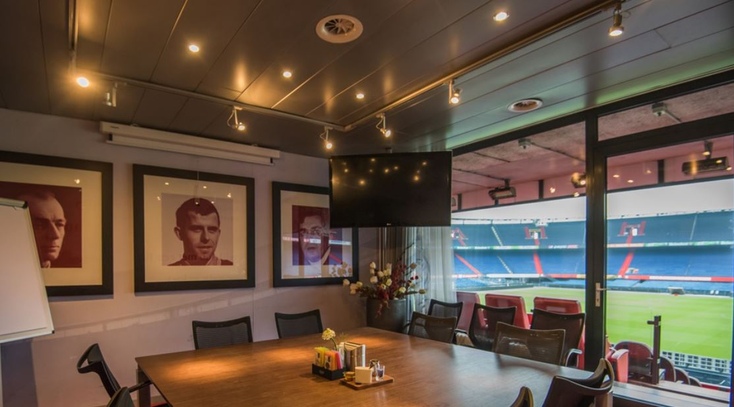
As mentioned before, there are large corporate areas of De Kuip in the Maastribune. The Director Seats are the most sought after in the ground, including decent catering and excellent views. There are also business units, business seats and comfortable seats available, so you’ll definitely find somewhere to stay depending on your budget.
Private Hire
Whether you’re looking to host business events, parties or meetings, De Kuip has the facilities to help you do just that. The club are willing to accommodate pretty much anything if possible and they have a very diverse selection of spaces, so if you’re looking for a venue in Rotterdam then it’s worth contacting them to see what they can do.
Stadium Tours & Museum
De Kuip has hosted numerous European Cup finals and other major matches, so it’s a place well worth visiting if you’ve got the time. Tours will take you into the dressing rooms, down the tunnel and to the side of the pitch. They run regularly throughout the week and each tour lasts for about ninety minutes costing €16.50 for adults and €12.50 for children.
About Feyenoord
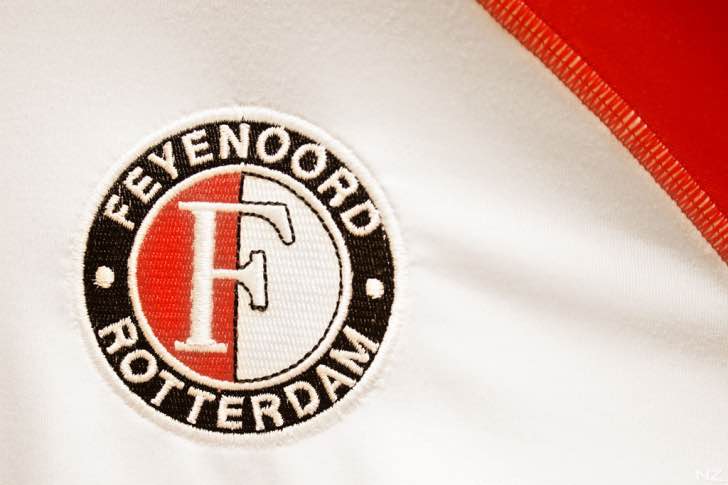
As mentioned at the start, Feyenoord are one of the most successful teams in all of Dutch football. To date they have picked up fifteen Eredivisie titles and thirteen KNVB Cups on the domestic stage as well as two UEFA Cups and one European Cup. There’s little question that the club’s most successful period came in the 1960s and 1970s when two of those European trophies and six league titles were picked up. They have also played continuously in the top-flight since they reached it in 1921, back when it was known as Eerste Klasse rather than the Eredivisie. That’s a better record than both Ajax and PSV.
Founded as Wilhelmina in 1908, the club was unsettled to start with and changed its name numerous times. It became SC Feijenoord in 1912 and remained under that title until 1974 when the Feijenoord became Feyenoord. In 1978 the club settled on its current name of Feyenoord Rotterdam because SC Feyenoord separated into its own amateur team. Their biggest rival is Ajax and when the two teams go head-to-head the derby is referred to as De Klassieker. One of the biggest changes will come to the club in 2019 when HC Feijenoord, an amateur football team called Sportclub Feyenoord, and Rotterdam Basketball all get brought into the frame as it becomes a multi-sports club.
De Kuip History
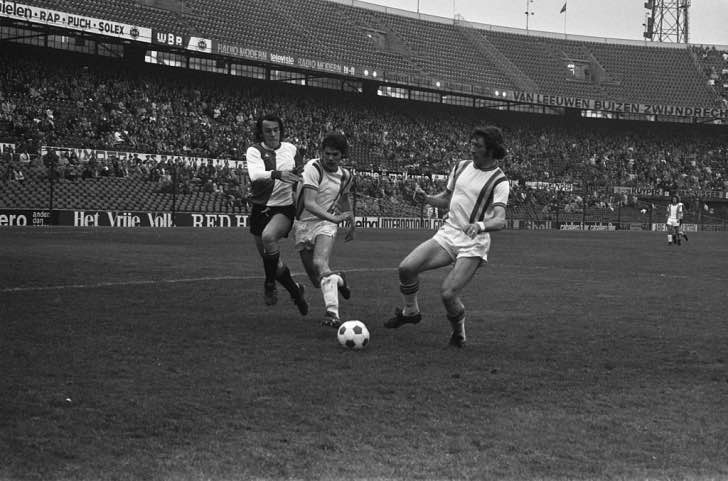
Though it’s official name is Stadion Feijenoord, the vast majority of football fans know the ground as De Kuip. A decision to build a new stadium was reached by Leen van Zandvliet, the then President of the club in the 1930s. He wanted it to be unique for a football ground on the continent, having two free-hanging stands and nothing obstructing views of supporters anywhere in the stadium. Such was the success of the new ground that many stadiums throughout Europe took it as their blueprint, including the likes of Barcelona’s Nou Camp. It could have been so different, with German occupiers in Rotterdam coming close to tearing it down for scrap usage during the Second World War.
The ground hasn’t just been used for Feyenoord matches. As well as hosting several games for the Dutch national side and numerous cup finals. One such final was the UEFA Cup Winners’ Cup in 1963 when Tottenham Hotspur became the first English club to be victorious in a European final. The most recent European final held there was the 2002 UEFA Cup Final. The likes of Michael Jackson, Eric Clapton and Bob Dylan have all played concerts there over the years, though such big music events have happened less and less frequently since the Amsterdam Arena opened its doors in 1996.
Future Developments
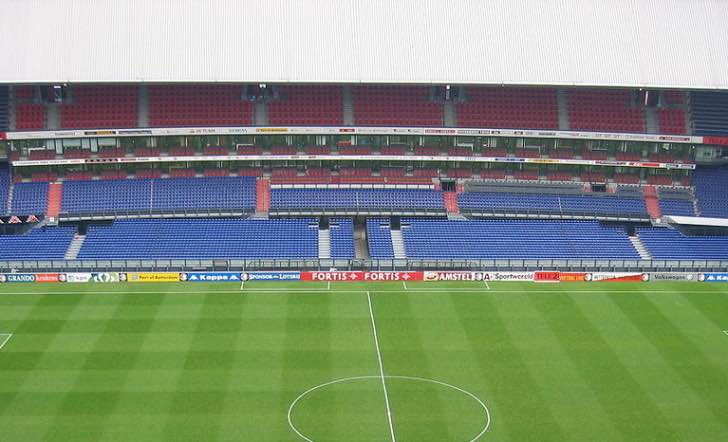
There has been talk of Feyenoord opening a new stadium since 2006, though the plans have been changed on a regular basis. It wasn’t until May 2017 that the city of Rotterdam agreed to the building of a new stadium, which has the working title of Feyenoord City. It was hoped that it would have 63,000 seats and would open ahead of the 2022-2023 season. However, in 2021 prices soared and after such a long wait, the project was scrapped.
